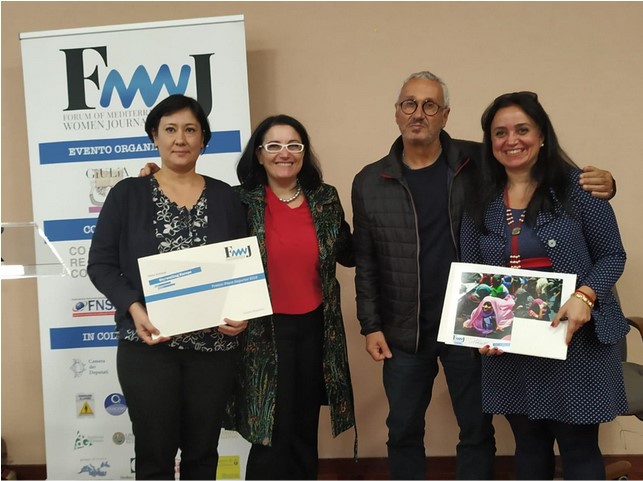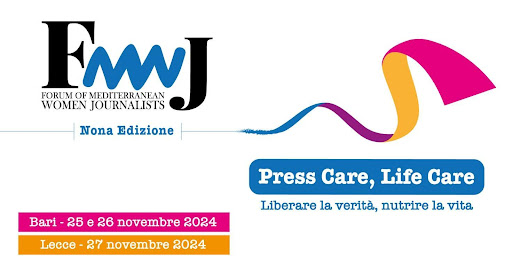Journalists, researchers, and activists from Turkish Kurdistan, Iraqi Kurdistan, and Rojava, as well as from Spain, Greece, the UK, Belgium, Sub-Saharan Africa, Palestine, Egypt, the Ivory Coast, and Italy are expected on November 25-26-27.
Since 2016, the Forum delle Giornaliste del Mediterraneo – Forum of Mediterranean Women Journalists (FMWJ) has been held every year around the 25th of November (International Day Against Violence Against Women) in Apulia, a region in the south of Italy and a crossroads of millenary cultures stretching out into the Mediterranean Sea.
Founded by investigative journalist Marilù Mastrogiovanni, the event is organised by the IdeaDinamica Cooperative, which also partners with the XQ.EUJOY project that publishes the online newspaper ‘XQ the News’.
The Objectives of the Event
The FMWJ aims to ‘build bridges, tear down walls: to promote a reflection on the journalism of investigative female journalists, as a garrison of Democracy, therefore, of Peace’, giving a voice to correspondents in conflict zones and to all those professionals, researchers, and activists who view their work as an active commitment to the defence of human rights and the fight against disinformation and fake news.
The sessions are organised in monothematic panels and streamed live on YouTube, Facebook and X/Twitter: a space for reflection on the current condition of women, more than 20 years after the World Women’s Conference in Beijing, which produced the most advanced declaration on women’s rights, approved by 189 countries but which remained a dead letter for many of them.
The event is characterised by its commitment to combat hate speech, sexism, and gender stereotypes, issues which are closely linked to the representation of women in the media, as they contribute to reinforcing or creating the patriarchal culture that underlies gender-based violence. The Forum is a large educative community on the road to ethical and inclusive journalism by promoting a decolonial and intersectional approach to journalistic storytelling.
In nine years, almost 300 experts (mostly all women, with some welcome male presence) have participated in the #FMWJ as speakers, including journalists, reporters, activists, scientists, and university researchers engaged in Human Rights and Gender Studies, who have shared experiences and testimonies from the different shores of Euro-Mediterranean countries, reporting on gender human rights gaps and identifying concrete actions to promote the advancement of women’s rights in European, Middle Eastern, North African, and Balkan countries.
The 2024 Programme
“Press care, life care. Liberating the truth, nurturing life’ is the main theme of the ninth edition. Protecting freedom of information means defending every aspect of democratic life: civil rights, human rights, and environmental and ecological justice.
The level of press freedom measures the resilience of the rule of law. In Italy, the instability of the publishing system and the precariousness of work for young journalists fail to guarantee turnover in a profession whose ranks are steadily shrinking.
While the new legislative reforms undermine the citizens’ right to be informed, the European Union is sounding the alarm about justice reforms, the protection of journalists from reckless lawsuits, and the crisis of plurality in public service broadcasting.
The 2024 Forum’s Programme will also deal with maternity, mental health, leadership in journalism, and social reproduction, which weighs, unpaid, entirely on the shoulders of women. Space will also be given to geopolitics with the participation of female journalists from Turkish and Iraqi Kurdistan, Rojava (North-East Syria), Spain, Greece, the UK, Belgium, the Ivory Coast, Sub-Saharan Africa, Palestine, Egypt, and Italy.
The work opens at the University of Bari on November 25, which is also the International Day against Violence against Women (established by the UN in 1999), in the presence of the Rector Stefano Bronzini and the President of the Council of the Puglia Region, Loredana Capone.
The FMWJ is also a major free deontological training event for female journalists. Each panel is structured as a real professional training course, recognised with deontological training credits for both journalists and university students, thus offering an important opportunity for growth and updating.
An International Network of Female Journalists
In nine years, the Forum’s organisation has received contributions from Co.Re.Com. Puglia, Amnesty International Italia, FNSI, Usigrai, and the Regional Council of Equality. The 2024 event is co-financed by the Bando Futura of the Apulia Region and the National Order of Journalists. In addition to the funding entities, the Forum of Mediterranean Women Journalists has garnered support from: UNESCO, the UN, OSCE, the Anna Lindh Foundation, UNHCR, the Presidency of the Chamber of Deputies, the Accademia Della Crusca, the Article 21 Association, UsigRai, Reporters Without Borders, Ossigeno per l’Informazione, the Master’s in Journalism at the University of Bari, the University of Malta, the University of Rojava, the University of Salento, the Association of European Journalists Bulgaria, the College of Journalists of Catalonia, the Czech Center for Investigative Journalism, the European Research Centre for Sustainable Innovation, the Uzbek Forum for Human Rights Berlin, Radio Radicale, numerous anti-violence centres, and other national and international associations.



